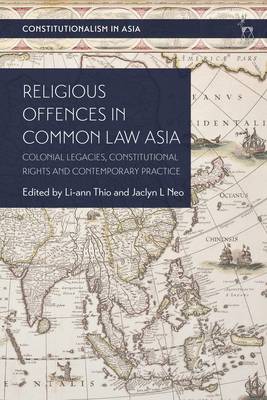
- Afhalen na 1 uur in een winkel met voorraad
- Gratis thuislevering in België vanaf € 30
- Ruim aanbod met 7 miljoen producten
- Afhalen na 1 uur in een winkel met voorraad
- Gratis thuislevering in België vanaf € 30
- Ruim aanbod met 7 miljoen producten
Religious Offences in Common Law Asia
Colonial Legacies, Constitutional Rights and Contemporary Practice
Omschrijving
This book provides in-depth comparative analysis of how religious penal clauses have been developed and employed within Asian common law states, and the impact of such developments on constitutional rights. By examining the theoretical and conceptual underpinnings of religious offences as well as interrogating the nature and impact of religious penal clauses within the region, it contributes to the broader dialogue in relation to religious penal clauses globally, whether in countries which practise forms of secular or religious constitutionalism. Asian practice is significant in this respect, given the centrality of religion to social life and indeed, in some jurisdictions, to constitutional or national identity.
Providing rigorous studies of common law jurisdictions that have adopted similar provisions in their penal code, the contributors provide an original examination and analysis of the use and development of these religious clauses in their respective jurisdictions. They draw upon their insights into the background sociopolitical and constitutional contexts to consider how the inter-relationship of religion and state may determine the rationale and scope of religious offences. These country-by-country chapters inform the conceptual examination of religious views and sentiments as a basis for criminality and the forms of 'harm' that attract legal safeguards. Several chapters examine these questions from a historical and comparative perspective, considering the underlying bases and scope, as well as evolving objectives of these provisions. Through these examinations, the book critically interrogates the legacy of colonialism on the criminal law and constitutional practice of various Asian states.Specificaties
Betrokkenen
- Uitgeverij:
Inhoud
- Aantal bladzijden:
- 480
- Taal:
- Engels
- Reeks:
Eigenschappen
- Productcode (EAN):
- 9781509946037
- Verschijningsdatum:
- 20/10/2022
- Uitvoering:
- Paperback
- Formaat:
- Trade paperback (VS)
- Afmetingen:
- 156 mm x 234 mm
- Gewicht:
- 571 g

Alleen bij Standaard Boekhandel
Beoordelingen
We publiceren alleen reviews die voldoen aan de voorwaarden voor reviews. Bekijk onze voorwaarden voor reviews.






